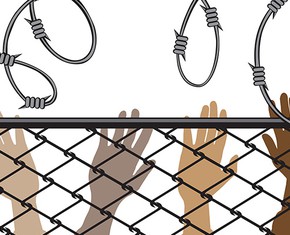The views expressed in our content reflect individual perspectives and do not represent the authoritative views of the Baha'i Faith.
Just about everyone has heard of the UDHR—the Universal Declaration of Human Rights. But did you know it does not yet have the full force of law?
In 1948, the United Nations proclaimed the UDHR, and that document became the first comprehensive international agreement to articulate the fundamental and inalienable rights of each human being. Called “the Magna Carta of all humanity,” the UDHR sets forth a high standard of human rights for everyone on the planet.
But many people don’t realize that the UDHR, with its 30 articles covering civil, political, economic, social and cultural rights, still isn’t legally binding. When nations sign international treaties and ratify them, the UDHR’s language has often been included—but today no universal enforcement mechanism exists to make sure nations actually do grant those human rights to their citizens.
That means the full realization of our human rights still depends on the laws and policies of individual nations. Because sovereign nation-states now have the sole responsibility for protecting human rights, the efficacy of the UDHR depends on the status or force given to them within each individual country’s laws. If a nation chooses to ignore the basic human rights of their citizens, it can, without sanctions, penalties or fear of punishment.
But that’s not the only way to think about universal human rights, as the Baha’i International Community boldly demonstrated in 1955 when it addressed ten recommendations for revising its Charter to the United Nations. The final Baha’i recommendation in that document called for a binding international Bill of Rights that all nations must follow:
X. It is recommended that the United Nations adopt a Bill of rights, which guarantees to every individual freedom of speech, of the press, of religion, and of thought, as well as freedom from racial and religious discrimination, freedom from arbitrary arrest and imprisonment, equality of the sexes, equality before law, equality of opportunity, and other basic human rights. The individual human being is a spiritual as well as a physical creation and the purpose of society is to provide for the evolution of spiritual qualities in a framework of unity sustained by law. – from the Baha’i International Community’s recommendations to the 1955 United Nations Charter Revision Conference.
After that Baha’i recommendation in 1955, the UN adopted two major international treaties in 1966: the International Covenant on Civil and Political Rights along with its two Optional Protocols; and the International Covenant on Economic, Social and Cultural Rights. Both of those treaties were ratified by a majority of UN member nations by 1976, when they went into full force in international law. Together, the Universal Declaration of Human Rights and these two subsequent treaties are now referred to as The International Bill of Human Rights.
If the International Bill of Human Rights became law everywhere, jail, torture and death for prisoners of conscience would end. Free speech would be legal in all countries. Freedom of religion would flourish for everyone. The oppression of people of color and women and the disabled would cease. The fundamental human rights to food, a place to live and an education would be guaranteed. Read through the UDHR and those two treaties, and you’ll find a beautiful vision for the future of humanity that we could conceivably adopt and enforce today.
The Baha’i teachings have called for the implementation of these basic human rights for a century and a half:
Every human being has the right to live; they have a right to rest, and to a certain amount of well-being. As a rich man is able to live in his palace surrounded by luxury and the greatest comfort, so should a poor man be able to have the necessaries of life. Nobody should die of hunger; everybody should have sufficient clothing; one man should not live in excess while another has no possible means of existence. – Abdu’l-Baha, Paris Talks, pp. 131-132.
Baha’u’llah taught that an equal standard of human rights must be recognized and adopted. In the estimation of God all men are equal; there is no distinction or preferment for any soul in the dominion of His justice and equity. – Abdu’l-Baha, The Promulgation of Universal Peace, p. 181.
Baha’is believe that adopting and enforcing an “equal standard of human rights” all over the world will help bring about human unity and peace.
















Comments
Sign in or create an account
Continue with Googleor